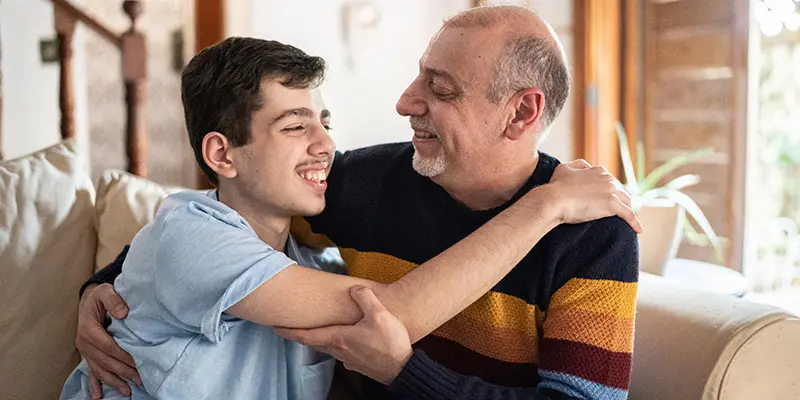
Content updated from previous publish date.
Do you have one of the estimated 1 in 36 children in the U.S. who are diagnosed with autism spectrum disorder (ASD)? If you’re the parent of a child with ASD, you know that an autism diagnosis is life-changing for your child, for you, and for your entire family. Autism is associated with deficits in social skills, communication, and the ability to form and maintain friendships. Kids with autism may have rigid thinking, may be hypersensitive to sensory stimuli, and may have limited interests. This can change the family dynamic and create unexpected challenges for parents and siblings. This blog will help you understand the latest science on what causes autism and how can you manage it.
If you’re the parent of a child with ASD, you know that an autism diagnosis is life-changing for your child, for you, and for your entire family. Click To TweetWHAT IS AUTISM SPECTRUM DISORDER?
ASD is a neurodevelopmental disorder that affects a person’s behaviors and ability to communicate, learn, and relate to others. Autism is not one single thing; it has many faces. Just look at a classroom full of autistic children, and you will see that they are not all alike.
- 31% have an intellectual disability
- Boys are diagnosed with autism at 4 times the rate of girls
- One-third have superior skills in 1 or more areas
- About 20% have epilepsy
In about one-third of kids with autism, it is common to experience normal development in the first year of life and then to regress in the second year of life.
WHAT CAUSES AUTISM SPECTRUM DISORDER?
Scientists have yet to pinpoint a specific cause for autism, however, they have discovered numerous contributing factors.
- Genetics: Autism is often attributed to genetics, but the increasing rate of the condition shows that genetics cannot be the sole cause. In fact, a 2019 study found that genetics accounts for only 10-20% of autism cases. It’s important to note that genetic variations don’t directly cause ASD. Rather, some genetic variations predispose a child to develop ASD if exposed to certain environmental stressors.
- Environmental stressors: Infections, inflammatory events such as immunizations, and exposure to environmental toxins like mold or industrial chemicals are environmental stressors that are associated with increased risk of autism. In addition, the increased use of prescription medications, including antibiotics, can cause harmful changes to gut bacteria. And kids with autism are more likely to have gut health issues. Research shows that the wide use of acetaminophen (Tylenol) in babies causes oxidative stress in the developing brains of young infants, which is associated with autism.
- IVF treatment: Some studies have found a link between certain fertility treatments, such as IVF, and ASD symptoms, but the research is mixed.
- Premature birth: Research has found that the chances of an autism diagnosis is 3.3 times greater in those born prematurely. pre-
- Advanced paternal age: According to research, advanced parental age is considered a risk factor for ASD.
The scientific community continues to search for causes of autism and may find additional contributing factors in the future.
THE CONNECTION BETWEEN FOOD AND AUTISM SYMPTOMS
Food can play a critical role in the severity of autism symptoms. Processed foods that are full of preservatives, pesticides, artificial colors and flavorings, and other chemicals may contribute to autism and can exacerbate ASD symptoms, according to a 2019 study. Foods that lack fiber promote the overgrowth of destructive bacteria, which may influence behavior. On the other hand, emerging research shows that consuming organic foods that are high in fiber and healthy fats may help.
Some foods can make autism worse. For example, many children with autism may have a sensitivity to gluten and dairy, which can trigger immune responses associated with autoimmune disorders. Removing dairy and wheat products from the diet can significantly reduce GI problems and other symptoms.
IMPROVING SOCIAL SKILLS IN AUTISM
Children with ASD have difficulty with social skills, and as a result, they are more likely to be bullied in school. They tend to be sensitive to scents, noise, bright lights, and powerful emotions. To help manage these issues, follow these tips:
- Seek school accommodations. Speak with your school administrators about accommodations or individualized education plans for your child. Smaller classroom sizes, for example, may be beneficial.
- Find pleasant sensory stimuli. Some kids with autism feel better while wearing headphones to reduce irritating noises. Others enjoy touching something with a texture they like. Find what works for your child.
- Try occupational therapy. Kids with ASD often exhibit emotional immaturity and have difficulty dealing with life’s stress. Occupational therapy can provide guidance in developing emotional skills, tolerating change, delaying gratification, and coping with setbacks.
- Try the “Theory of Mind.” Autistic children have a hard time understanding that other kids and adults see things differently than they do. This can make them uninterested in things that are important to others. You can practice the Theory of Mind by asking your child what they think other people are thinking.
- Stick to routines. Kids with ASD tend to do better with routines and advance notice of any changes.
- Seek professional help. Going to a mental health professional who understands the role of the brain in ASD can be helpful for both children with autism and their parents. You can learn proven strategies to improve ASD symptoms, help your child reach their potential, and reduce friction in your home life.
IMPROVING QUALITY OF LIFE IN AUTISTIC CHILDREN
Remember that managing autism symptoms is a daily practice that requires consistent effort. By following these strategies on a regular basis, you may be able to help your autistic child experience significant improvements in their everyday life.
Autism, ADD/ADHD, and other brain-based mental health issues can’t wait. At Amen Clinics, we’re here for you. We offer in-clinic brain scanning and appointments, as well as mental telehealth, clinical evaluations, and therapy for adults, teens, children, and couples. Find out more by speaking to a specialist today at 888-288-9834 or visit our contact page here.





Our great grandson is non verbal. I’ve read J B Handley and his son, Jamie book,”Underestimated, An Autism Miracle “ About new method, Spelling 2 Communicate or S2C. Jamie now communicates thru keyboard. Actually, speaking and controlling our body is fine motor skill. Our great grandson is almost 6. Isn’t he old enough to start this program ?
Comment by Donna White — October 26, 2022 @ 6:56 PM
Hi Donna! He absolutely can! 🙏🏻
Comment by Rose Peguero — September 8, 2023 @ 3:59 AM
I have four grandchildren and one child who's on the Spectrum. The 16 year old grandchild was diagnosed late we suspected there was something like add but they say she's actually on the Spectrum she's a beautiful brilliant talented teenager but has a lot of angst and anger due to the loss of her father. She has two little brothers who are on the expectum one of them who doesn't talk at all yet and he's nearly four and one of them who's also brilliant and wonderful and when he laughs he lights up the whole room but he is very very particular about who he lets into his Circle and is a very needy child. I often times suffer the guilt because I'm bipolar that so many of my children and grandchildren have some form of mental illness I struggle everyday with my own bipolar issues to stay on top and not sink into the mire of depression and the danger of suicide I'm glad to see that you're getting on top of all this spectrum stuff and you have answers for these parents my daughter already has many of these resources working for her children my granddaughter goes to a special school and my two grandsons have therapists who come in two or three a day and the older boy now goes to school and the younger one had to be pulled out because they didn't have the resources to handle them he's not terribly violent or abusive or anything like that he's just difficult he doesn't want to do anything he doesn't understand he can't speak he has a talking board anyways I'm happy to see the doctor amen is addressing his issues and has found ways for them to resolve or manage the ASD child. I've been reading Dr amen's books for many years since my aunt bought them off of public television and I was very appreciative on the one section on bipolar in his book it's helped me a great deal
Comment by Renee Baker — September 8, 2023 @ 7:46 AM
My Son with autism (age 31) has been doing S2C for about three years. He is having a significant breakthrough right now. He is on the middle of the autism spectrum, on a scale of -40 (very severe) to +40 (mild, aspberger's syndrom,e, socially awkward), he is a +2. He can say things like "what's for dinner", recite the Gettysburg Address (with prompting), but he couldn't carry on a conversation for 3 turns to save his life. He can't tell you what he wants to do today, or what his hopes and dreams are. Now, after twice a month S2C with a provider for about a year, combined with Dad and I practicing with him when we can, he is answering questions like, "what is a group of people who you think might be marginalized?" As fast as I can say the words, he spelled out "Non-spoeaking autistics." The lesson continued to say how people can overcome the depression and low self esteem that comes from being marginalized, and develop resilience. The provider asked him "What does resilience mean to you?" and he spelled out, "My mom is the definition." I've never heard anything like that from him in his life! I would say if your kiddo knows the alphabet and the sounds the letters make, he's old enough. When my son started S2C, he couldn't spell "A cat sat on a mat.", but using this method, which teaches spelling imbedded in each (very interesting) lesson, he can spell many more complicated and age appropriate words. We go to the Spellers Center in Oceanside, CA. (Formerly Transcending Autism and Apraxia)
Comment by Barbara Lopez — September 8, 2023 @ 9:17 AM
I am disappointed to see you linking vaccines with autism. Many people do not understand the difference between association and causation. Also, there are many autistics among communities who do not participate in any vaccinations. Do you have studies backing up your theory regarding inflammation (from any source) being causative? Our family has a number of ASD and ADHD members for several generations. We have an equally strong number with autoimmune diseases. Perhaps there is a connection.
Comment by Debra Lundgren — September 8, 2023 @ 9:28 AM
Do you have information or articlers about Auditory Processing Disorder and how that is different or relates to autism.
Comment by George Patriki — September 8, 2023 @ 8:27 PM
My great grandson is 3 and non verbal. Is there help for him in Cincinnati ohio
Comment by Rose Thompson — September 9, 2023 @ 6:48 AM